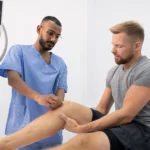If you’re a veteran struggling with chronic foot pain or mobility issues, it’s important to understand the VA disability rating for flat feet. The VA evaluates flat feet, also known as pes planus, under a specific code, and the rating you receive can significantly affect your monthly compensation and access to care.
At VetLaw, we focus exclusively on helping veterans secure the benefits they’ve earned. Founded by a Marine Corps veteran who previously worked as an attorney for the Department of Veterans Affairs, our team has firsthand knowledge of how the VA system works and how to navigate it successfully. Whether you’re filing an initial claim or appealing a denial, VetLaw brings compassion, professionalism, and exceptional experience to every case.
Understanding Flat Feet as a VA-Recognized Disability
Flat feet occur when the arches of your feet collapse or fail to develop properly. This condition can be congenital (present from birth) or acquired later in life. For veterans, flat feet are often caused or worsened by the physical demands of military service, such as wearing heavy boots, rucking long distances, or standing for extended periods on hard surfaces.
Because the VA recognizes pes planus as a potentially disabling condition, veterans can qualify for compensation if they can prove a connection between their flat feet and their time in service. To do this, you’ll need medical documentation of your condition and evidence that links it to your military duties.
How the VA Evaluates Flat Feet
The VA disability rating for flat feet is determined under Diagnostic Code 5276, found in 38 CFR § 4.71a. Ratings range from 0% to 50%, depending on whether the condition affects one or both feet and the severity of your symptoms:
- 0%: Mild symptoms relieved by proper arch support (non-compensable)
- 10%: Moderate symptoms in one or both feet; includes pain and inward bowing of the Achilles tendon
- 20%: Severe symptoms in one foot; marked deformity, swelling, and characteristic pain
- 30%: Severe symptoms in both feet (bilateral pes planus)
- 30% (unilateral) / 50% (bilateral): Pronounced symptoms not relieved by orthotics; includes extreme tenderness, spasms, and significant displacement of the Achilles tendon
The more functional impairment and structural damage you experience, the higher your rating may be.
The Role of Secondary Conditions
An important aspect of your VA disability rating for flat feet is whether your condition has caused other medical issues. A common example is plantar fasciitis, a painful inflammation of the tissue that connects your heel bone to your toes.
When pes planus causes or aggravates a secondary condition like plantar fasciitis, you may be eligible for an additional rating. This can raise your overall compensation. Ratings for plantar fasciitis range from 10% to 40%, depending on severity and whether the condition affects one or both feet.
Other conditions linked to flat feet may include:
- Shin splints
- Arthritis
- Bone spurs
- Bunions or calluses
- Pain in the knees, hips, or lower back
Establishing Service Connection for Flat Feet
To qualify for a VA rating, you must show that your flat feet were caused or aggravated by your military service. This is known as establishing a nexus. You’ll typically need:
- A current medical diagnosis of pes planus
- Evidence of an in-service event or injury that could have caused or worsened the condition
- A medical opinion linking your current condition to your service
What If You Receive a 0% Rating?
A 0% VA disability rating for flat feet means that the VA acknowledges your condition but doesn’t consider it severe enough to be compensable. While you won’t receive monthly payments, you are still eligible for VA healthcare services related to pes planus, and you can pursue a higher rating if your symptoms worsen.
Receiving a 0% rating can be frustrating, especially if you’re experiencing real pain and limitations. This is where working with an experienced VA disability lawyer can make a difference.
What Happens If My Claim Is Denied?
Unfortunately, many veterans receive a denial or a lower-than-deserved VA disability rating for flat feet on their first claim. If this happens to you, don’t give up. You have three main options for appealing a denial:
- Supplemental Claim: Submit new and relevant evidence to support your claim.
- Higher-Level Review: Request a senior VA reviewer to reassess your case without new evidence.
- Board Appeal: You can request a formal hearing before a Veterans’ Law Judge or submit evidence for consideration by the Board of Veterans’ Appeals.
How to Maximize Your Flat Feet VA Rating
Getting the highest possible VA disability rating for flat feet often depends on the quality of your medical evidence and how well your claim is presented. Here are a few tips to strengthen your case:
- Get a medical diagnosis from a specialist, such as a podiatrist or orthopedist.
- Document your symptoms thoroughly, including daily pain levels and how they impact your work and daily life.
- Provide statements from family members or fellow service members who can describe how your condition has affected you.
- Keep records of all treatments, including orthotics, physical therapy, and medications.
- Follow up regularly with your doctor and communicate any worsening of your symptoms.
Why Work with a Veterans Disability Lawyer?
You’re not required to work with a lawyer, but having a VA-accredited attorney on your side can dramatically improve your chances of success. At VetLaw, we understand the VA’s complex system inside and out. We help veterans build strong cases, avoid common mistakes, and fight back against unfair decisions.
When you choose VetLaw, you’re not just hiring legal representation; you’re working with a dedicated partner who is committed to helping you obtain the justice and compensation you deserve. We’ll take the time to understand your unique situation and tailor a strategy to get you the benefits you’ve earned through your service.
Call VetLaw Today for Help With Your VA Disability Rating for Flat Feet
If your flat feet are making daily life painful or holding you back from work, you shouldn’t have to fight the VA on your own. Whether you’re filing for the first time or appealing a denial, VetLaw is ready to stand by your side.
We’ve helped thousands of veterans across the country secure the compensation they deserve for service-connected disabilities, including pes planus, plantar fasciitis, and other foot-related conditions. Our team knows what it takes to build a winning case, and we’ll be with you every step of the way.
Contact us today for a FREE case review. Call (336) 355-8387 or fill out our online form to speak with a member of our team. Let VetLaw help you get the rating and the peace of mind you deserve.







